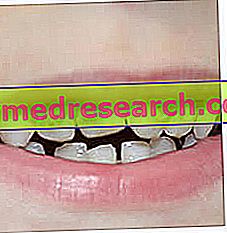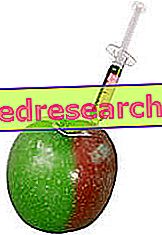Carious milk teeth
Most likely, tooth decay is the most common dental infection among young children.

Causes
Whether it is a milk tooth, a wisdom tooth or any other permanent tooth, it does not matter. It is scientifically proven that caries is always favored by the same causes. They are always "them" responsible: the bacteria of the oral cavity that hide in the dental plaque, a milky and sticky patina that adheres like glue to the surface of the teeth. The hundreds of germs that anchor to the bacterial plaque feed on the glucose present in the food residues, forming lactate as a waste product. Because of its acidity, this substance is able to gradually dissolve the dental enamel, affecting the dentine.
We have therefore seen that the causes of caries in milk teeth coincide with those that trigger cariogenic processes in the teeth of adults. What makes the difference is the surprising speed with which the bacteria corrode the enamel of milk teeth. The explanation is quite obvious: the milk teeth are much smaller than the permanent teeth, and their enamel is less mineralized; therefore, the bacteria of the oral cavity are able to destroy it more easily, reaching the underlying dentin and thus triggering a terrible toothache.
Curiosity
Some parents are convinced that the destruction of the tooth enamel of their children's milk teeth happens so quickly because the dental infectious process has begun even before the tooth eruption. The above, however, does not find any scientific evidence, since a tooth can become carious only after having erupted through the gum. Totally included teeth cannot be caried.
Risk factors
Clinical observations show that newborns who are given a honey-or-sugar soother to ... "promote sleep" are much more at risk of tooth decay than other children who are not given ( bottle caries ). From here we understand how it is necessary to avoid accustoming the child to falling asleep with the sweetened pacifier: a newborn that acquires this habit, almost certainly will continue to request the pacifier with honey even after the eruption of milk teeth.
The bacteria that populate the oral cavity tend to fix tenaciously in some points of the tooth surface; fed by the sugars that are not removed, the germs begin to "colonize" the milk teeth forming real clusters of plaque. Unfortunately, children are attracted as sweets and candy magnets: the hyperzuccherate delicacies remain long in the mouth, thus favoring tooth decay. Not to forget, then, that children not only tend to feed on sugary snacks (full of preservatives, dyes and hydrogenated fats), but they continue to eat them over and over again during the day: this behavior, far from common sense, other does nothing but feed the bacteria in their "unstoppable and insatiable desire to devour the tooth" (in reality, as we have seen, the bacteria do not destroy the tooth on purpose or because they feed on it, rather they are the acid waste of their metabolism to gradually corrode the dental enamel).
Small children are not able to brush their teeth alone with toothbrush and toothpaste, and it is the poor dental hygiene that undermines the health of teeth. To this is added the desire (sometimes almost obsessive) of tasty sweets, typical of a tender age.
Among the factors that can predispose to caries in milk teeth there is no lack of fluoride : not surprisingly, many pediatricians and dentists recommend supplementing the diet of young children with fluoride supplementation to prevent tooth decay in milk teeth. It is however necessary not to undertake preventive caries therapy alone: only the pediatrician can in fact indicate the most suitable dose for the child. A fluoride overdose can give rise to a rather dangerous syndrome known as fluorosis.
Treating decayed milk teeth
Deciduous milk teeth that need filling must be treated like permanent teeth. Common place to debunk is the false belief that decayed milk teeth should not be treated because they are destined to fall: we remember that a dental infection can anticipate what should be the physiological fall of the milk tooth, thus laying the foundation for teeth crooked or, worse still, for a future dental malocclusion.
In some cases, the cariogenic process in deciduous teeth manifests itself so quickly that, when contacting your dentist to try to heal the infection, it is now too late to prolong (by a few months or a few years) the physiological fall. Where the filling is not sufficient to cure a cavity that has gone beyond the dentin, invading the pulp of the tooth, it is necessary to intervene with more drastic methods: extracting the carious milk tooth can sometimes be the only conceivable solution.



